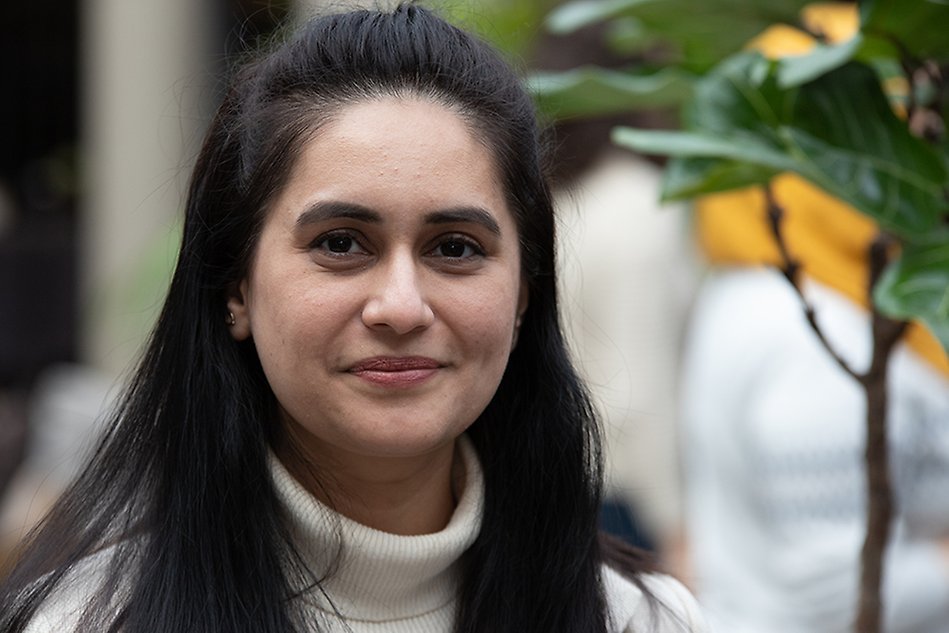New method makes digital transactions more secure
Hi there Sundas Munir, doctoral student in Information Technology. You presented your research on your licentiate seminar in October 2023. Can you tell us a bit about that?
If I cannot save lives, I am devoted to safeguarding financial well-being–I strive to protect people’s money.
Sundas Munir
“My licentiate thesis revolves around the realm of smart contracts. In simpler terms, computer programs that are crucial for carrying out financial transactions with cryptocurrencies. Recognising the inherent security risks associated with smart contracts, I focus on ensuring their correctness and security pre-deployment, safeguarding the integrity of the applications they underpin.”

Sundas Munir research is about smart contracts and how to make them more secure.
About Sundas Munir
What is your educational background?
“I have a master’s in computer science from Quaid-i-Azam University Islamabad in Pakistan and a Master’s in Digital Forensics from Halmstad University in Sweden.
When did you come to Halmstad University?
“I initially came to Halmstad University in September 2017 for my Master’s in Digital Forensics.”
Why did you choose Halmstad University for your doctoral education?
“I chose Halmstad University for my doctoral education because of its renowned expertise in cybersecurity. Recognising the University’s reputation for offering the best education in this area, it became my natural and obvious choice as I intended to focus my research on the cybersecurity aspects of blockchains.”
When and how did your interest in your research subject start?
“My interest in the security of computer programs, cryptocurrencies and blockchains began during my master’s education at Halmstad University. The comprehensive curriculum and exposure to cutting-edge technologies laid the foundation for my fascination with the security challenges inherent in these domains, sparking a keen interest that has since evolved into the focus of my ongoing research.”
What is the challenge with smart contracts?
“Despite the significant efforts by current methodologies in identifying security vulnerabilities within smart contracts, a notable number of issues persist unexplored. One is the challenge regarding non-determinism within the Ethereum ecosystem, which means that certain actions may not produce the same result every time they are executed. In an Ethereum ecosystem context, where smart contracts are self-executing programs with coded agreement terms, making deterministic actions are imperative. My research addresses these issues, contributing insights that advance our understanding and enhance the overall security of smart contracts.”
How have you contributed to making smart contracts more secure?
“I propose an automated approach that pinpoints the parts in the source code of smart contracts that attackers could easily manipulate. My approach identifies whether the attacker’s influence on certain values could impact critical smart contract operations. This way, my research strengthens smart contract resilience against potential attacks.”
During the work with your thesis, has anything surprised you?
“It is notably surprising that even after thorough audits, recent smart contracts still exhibit vulnerabilities that researchers have long been working to address. This discovery underscores the need for continuous vigilance and innovative solutions to ensure the robustness and security of smart contracts.”

How can society benefit from your research?
“My research, focusing on enhancing the security of smart contracts, directly benefits society by fortifying the backbone of blockchain-based applications. With blockchains playing pivotal roles in sectors like energy, transportation, medicine, and finance, ensuring the reliability of smart contracts contributes to a safer and more trustworthy digital landscape, impacting society at large.
A simple yet impactful motive drives my research: If I cannot save lives, I am devoted to safeguarding financial well-being–I strive to protect people’s money.”
Who have you collaborated with?
“In addition to the valuable supervision from my Ph.D. advisor, Walid Taha, I was fortunate to collaborate with Christoph Reichenbach at Lund University. Their insightful input significantly influenced and shaped my work. I am also grateful for the opportunity to collaborate with researchers at the University of Southern Denmark and receive valuable insights and feedback from researchers at the IT University of Copenhagen and the Fraunhofer Institute for Applied Information Technology FIT in Germany.”
What are your plans for the future?
“In the future, I aspire to further contribute to the field of blockchain technology and smart contract security. Building on the insights gained from my research, I plan to explore innovative solutions and collaborate with industry experts to implement effective measures that enhance the resilience and reliability of blockchain-based systems.”
Text: Anna-Frida Agardson
Portrait picture: Roland Thörner
Picture: Pixabay

